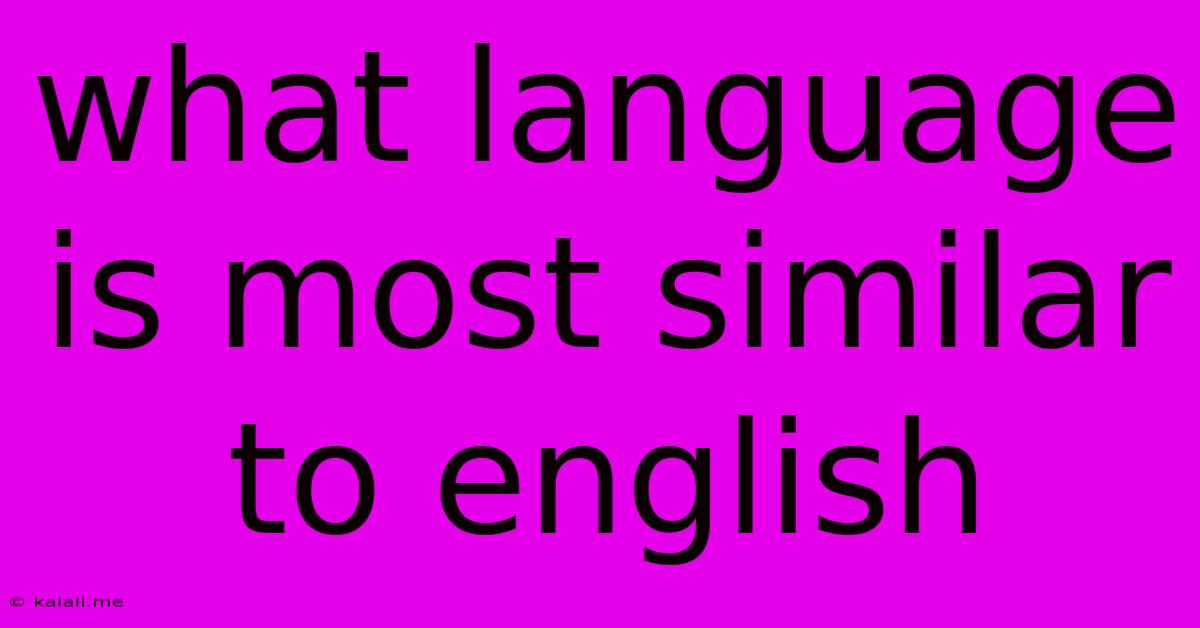What Language Is Most Similar To English
Kalali
May 21, 2025 · 3 min read

Table of Contents
What Language is Most Similar to English? Unraveling the Linguistic Family Tree
This article delves into the fascinating question of which language most closely resembles English. While a definitive answer depends on how you define "similarity," focusing on shared vocabulary, grammar, and historical roots provides a clearer picture. We'll explore the strong contenders and the factors that make linguistic comparisons complex.
Finding the language most similar to English isn't a straightforward task. It requires considering various linguistic aspects, including shared vocabulary (lexicon), grammatical structures (syntax), and phonology (sounds). Furthermore, the degree of similarity can vary based on the specific dialect of English being compared.
Frisian: The Closest Relative
The strongest contender for the title of "most similar language to English" is Frisian. This West Germanic language, spoken by a relatively small population in the Netherlands and Germany, shares a surprisingly high number of cognates (words with a common ancestor) with English. Many everyday words in Frisian have almost identical counterparts in English, often with minimal phonetic differences. This close relationship stems from their shared ancestry in Proto-Germanic, a language spoken millennia ago. The grammatical structures, while not identical, also exhibit significant similarities compared to other Germanic languages.
Other Germanic Languages: A Family Resemblance
While Frisian takes the lead, other West Germanic languages like Dutch and German also bear a significant resemblance to English. These languages share a considerable amount of vocabulary with English, particularly in areas related to basic concepts and everyday objects. However, their grammatical structures differ more significantly from English than Frisian's. German, in particular, boasts a more complex grammatical system with case declensions and verb conjugations that differ substantially from English's relatively simpler structure. Dutch, being geographically closer to England, maintains a stronger lexical similarity but still falls short of Frisian’s overall closeness.
Beyond Germanic: Influences and Borrowings
It's important to remember that English's lexicon is a rich tapestry woven from numerous sources. Its Germanic roots are undeniable, but centuries of contact with other languages, including Norman French, Latin, and Greek, have profoundly shaped its vocabulary. This makes comparisons solely based on vocabulary potentially misleading. While many words are borrowed, the underlying grammatical structure often provides a better indication of true linguistic kinship.
The Role of Phonology and Syntax
While vocabulary offers an accessible comparison point, the sounds (phonology) and sentence structure (syntax) provide crucial insights into deeper linguistic similarities. Frisian's phonology exhibits closer parallels with certain English dialects than Dutch or German. Similarly, its syntactic structures, while possessing unique characteristics, align more closely with English's relatively straightforward sentence construction compared to the more complex systems found in German.
Conclusion: A Matter of Perspective
Ultimately, declaring one language as definitively "most similar" to English is an oversimplification. Frisian emerges as the strongest contender due to its remarkable lexical and structural similarities rooted in their shared Proto-Germanic ancestry. However, the degree of similarity depends on the specific criteria used – vocabulary, grammar, pronunciation, or a combination thereof. Appreciating the complexities of linguistic evolution and the influence of historical contact is crucial in understanding the relationships between languages. The connections between English and its Germanic relatives, including Frisian, Dutch, and German, highlight the dynamic nature of language development and the enduring legacy of shared linguistic heritage.
Latest Posts
Latest Posts
-
Calories In A Cup Of Uncooked Rice
May 21, 2025
-
Find A File In Linux Recursively
May 21, 2025
-
I Made A Fireable Mistake At Work
May 21, 2025
-
How To Turn Off Hot Water
May 21, 2025
-
Can You Have Sex On Ramadan
May 21, 2025
Related Post
Thank you for visiting our website which covers about What Language Is Most Similar To English . We hope the information provided has been useful to you. Feel free to contact us if you have any questions or need further assistance. See you next time and don't miss to bookmark.